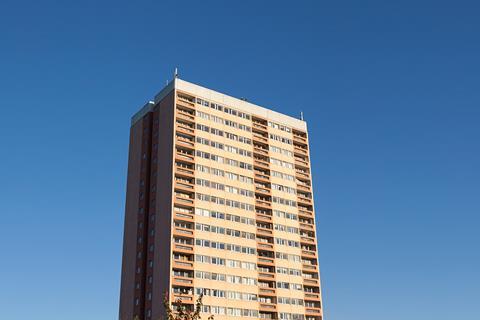New Building Safety Regulator tells building owners that not registering by 1 October is a criminal offence
Around 2,000 high-rise buildings have yet to have their details registered with the new Building Safety Regulator (BSR) ahead of the 1 October deadline.

The BSR, which sits in the Health & Safety Executive, said that as of Wednesday this week registrations for 10,080 buildings had been started since the process opened in April.
The BSR’s data modelling shows there are around 12,500 higher-risk residential buildings – defined as over 18m in height – needing to be registered overall.
This means as of Wednesday there were still around 2,400 buildings yet to be registered, although BSR says the number is changing daily.
The BSR this week issued a reminder that not registering details of higher-risk buildings by 1 October as required under the Building Safety Act is a criminal offence.
A spokesperson told Building however it believes it is “on track” with registrations.
Chris Griffin-McTiernan, deputy chief inspector of buildings at BSR, said: “I would encourage any organisation that has not registered their high-rise building, to do so now. There is guidance available to help you comply with the law.
“The creation of this register is a major step forward in terms of building safety in England. Residents themselves will soon have access to the register. This new transparency will shift power towards those who live in these buildings. Residents deserve the better oversight we will be able to provide with the register.”
>>See also: We are entering a new era for building safety - but are we ready for the new regulator?
>> See also: Industry shocked by Building Safety Regulator head’s sudden departure
The requirement to register buildings by 1 October is just the first step in numerous new rules designed to improve safety. Owners will have to perform a building safety risk assessment, introduce measures to manage risks and produce a safety case report for their building. From April 2024 the BSR will issue building assessment certificates.
At-a-glance: the Building Safety Regulator’s role
- To oversee the safety and standards of all buildings.
- Regulate the building control profession, through new registration requirements, a competence framework, codes of conduct and performance standards, with a “level playing field” between public and private control bodies.
- Owners of higher-risk residential buildings – defined as over 18m in height – will have six months from April to register their buildings with the BSR. They will have to perform a building safety risk assessment, introduce measures to manage risks and produce a safety case report for their building. From April 2024 the BSR will issue building assessment certificates.
- Introduce a “gateway” system, under which the BSR will assess whether risks and roles and responsibilities are understood at different stages of construction.
- At the planning stage, known as “gateway one” the BSR is a statutory consultee and can raise concerns about fire safety risks in plans for high-rise residential buildings. This is not part of the Building Safety Act and came into effect in 2021.
- At the design stage, before work starts, clients must be able to demonstrate how proposals comply with requirements. This is expected to come in after October. The BSR will require information about how requirements governing the competence of dutyholders (including the clients, designers, principal designers, contractors and principal contractors), the “golden thread” record of information about the building and reporting requirements will be met.
- Applicants will have to demonstrate that they have appropriate strategies to manage the construction phase to support building regulations compliance and reduce the possibility of building safety risks arising.
- During the construction phase, those involved in the design and construction process will be required to notify the BSR of major changes to the scheme and meet record-keeping requirements and maintain accurate information to hand to the building owner at planning gateway three.
- The HSE has already set up a residents panel, a requirement under the act.
Key dates
- 1 October - period for high risk buildings registration ends
- October - regulations for gateways 2 and 3 expected to come into effect
- October - BSR to take over regulation of the building control profession
- April 2024 - BSR to start issuing building assessment certificates










No comments yet